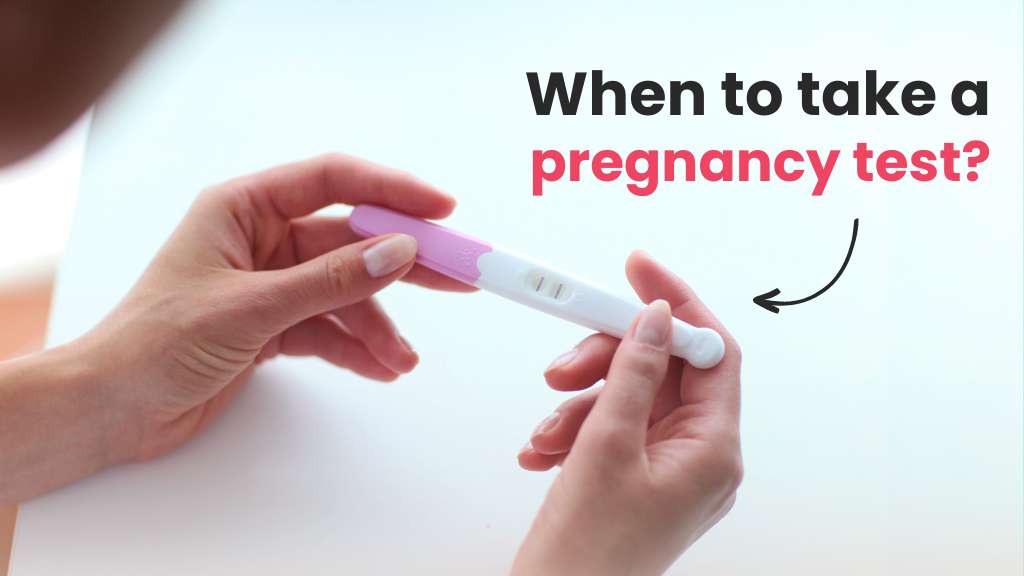
All anticipating to-be mums will be eager to get hold of the testing kit once they miss their periods. Oh, you are not one of them? Are you dreading that pregnancy? Well, pregnancy kits are super simple to use and rarely go wrong when you use them with the right instructions. So how long should you wait to take a pregnancy test to get the right results?
The best time to take a pregnancy test is 7 days after a missed period. Some tests do detect pregnancy after 14 days or so after intercourse but the body needs time to produce enough levels of hCG. Testing before you miss a period can increase your chances of getting a false negative result.
There is always a chance of error with the most effective birth control methods. After all, it’s just one sperm that fertilizes the egg. OTC pregnancy tests test the levels of human chorionic gonadotropin (hCG) in your urine. hCG is a hormone that is produced by your body when your fertilized egg attaches to your uterine lining or outside the uterus. Depending on the type of test you take, you may
- Collect your urine in a cup (and dip a testing stick into it or use an eyedropper to take a small amount of urine into a different container)
- Place the testing stick into your urine flow to catch the flow midstream
So, how long should you wait to take a pregnancy test result? Wait for 2 to 3 minutes to see the results. Here’s what the stick will display:
- The words “not pregnant” or “pregnant”
- A symbol such as a minus or a plus
- A line
- A change in color
What are The Different Types of Pregnancy Tests?
How long you should wait to take a pregnancy test result also depends on the type of pregnancy test you are taking. As recently as the 1970s, women had to wait till they missed a period to take a test to confirm a pregnancy while the results took up to two hours. Modern science has brought a change to that with tests that can give you a result that’s faster and more accurate.
At-home pregnancy tests check for hCG (pregnancy hormone) levels in your urine. You can detect it 12 to 15 days after ovulation if you have a 28-day menstrual cycle. These tests are almost as accurate as those given at a medical office. However, there are a few things to remember while choosing the kind of pregnancy test you want to take.
1. Urine Test
Urine tests are the most common at-home pregnancy tests done at a healthcare provider’s office or with an over-the-counter kit. To use such a kit, pee on the end of the test stick and wait for some time as it measures your hCG levels. Or you could pee in a cup and dip the stick into it.
About 10 days after conception, your urine will carry small amounts of hCG. Sooner or later than that, you might get a false negative result. For more reliable results, wait until the first day of missing your period to take a pregnancy test.
2. Blood Test
Blood tests for pregnancy detection are rarely done because of their high cost. Why spend more when you can get the same results with a less expensive urine test? However, healthcare providers may ask you to take a blood test for the following reasons
- If you have complications like an ectopic pregnancy (when a fertilized egg implants anywhere but the uterus)
- If you have a miscarriage (losing pregnant at or before 20 weeks)
- If you think you may be having multiple pregnancies
- If you are undergoing or have had fertility treatments
- If your pregnancy is been deemed as high-risk
Results from a blood pregnancy test can take longer than urine tests but they are capable of detecting even the slightest levels of hCG. There are two types of blood pregnancy tests:
- Qualitative hCG blood test: This test tells you if hCG is present or absent in your blood with higher accuracy than a urine test.
- Quantitative hCG blood test: This test tells you the count (an exact number) of hCG levels giving you a detailed insight into how your pregnancy is progressing.
How Long to Wait for Pregnancy Test and Other Prenatal Appointments?
You can do your pregnancy test even on the first day of your missed period. If you do not know when your next period is due, wait till 21 days have passed after you had unprotected sex. So how long does it take to test positive for pregnancy? It depends on how the hCG levels vary from woman to woman. Follow the instructions given in this article to check how long should you wait to take a pregnancy test. Typically the days mentioned here work for healthy women.
Here are some signs that you should check for pregnancy:
1. Missed Period
Once you miss a period the next thing you know you are thinking “how long should I wait to take a pregnancy test?” A missed period is one of the most reliable signs of pregnancy if you have been having unprotected sex. Also, track your cycle closely so that it isn’t difficult to know whether you are late or not. Consider taking a test if it’s been a month since your last period (oh, this is the generalization for women with a 28-day cycle).
Remember that your periods can be skipped or delayed due to certain medical conditions, exercises, diet, or stress. And pay attention to your flow when you begin suspecting pregnancy. It’s common to have spotting or light bleeding in the early weeks of conception. This is because the egg is burying itself deeper into the uterine lining during implantation.
You should also take note of any change in the amount of blood, texture, or color. Get in touch with your doctor if you had a positive result for your pregnancy test or if you have bleeding. It’s crucial because it could mean so much for your fetus and your pregnancy journey ahead.
2. Experiencing Cramps
Cramps can be similar to the ones you have during your periods. Implantation causes just that and it may lead you to think it’s your period coming. So bare for some time and wait for it to arrive. If it doesn’t, it means you need to take a test. Hormone levels vary by pregnancy and by women.
3. Tender Breasts
Tender breasts are one of the most common early signs of pregnancy. The more your body produces the pregnancy hormones, progesterone, and estrogen, the more your body will begin to experience changes. It’s to support and nurture your baby’s growth.
Your breasts will grow large and feel tender to touch due to increased blood flow. The nipples might hurt and the vein there will appear darker than usual. Discomfort in the breasts is also a sign of incoming periods so this symptom doesn’t always indicate pregnancy. But again, if you don’t get your periods after a while, taking a test is a good idea.
4. Other Symptoms of Pregnancy
Along with sore breasts and cramps with no periods, there are other signs of early pregnancy that you should watch out for
- Frequent urination
- Exhaustion
- Food aversions
- Nausea
As weeks go on, these symptoms may get stronger before the levels of hCG in your body even out in the first trimester. If you notice any unusual symptoms, you should take a test and get yourself checked out.
5. Failed Contraception
Condoms, birth control pills, and other types of contraceptives are not 100% foolproof. In other words, there is always a chance of being pregnant no matter how careful you are. So despite your birth control methods, consider taking a test if you experience any of the signs listed above. So how long should you wait to take a pregnancy test after a failed contraception? You could take the test when your next period is delayed by more than a week.
According to Planned Parenthood, 9 out of every 100 women on the pill get pregnant if they take the pills undirected. Nearly 18 in every 100 women who rely on condoms get pregnant every year. If you are concerned about contraceptive failure, get in touch with your doctor about alternative contraceptive methods such as IUD (Intrauterine Device). Less than 1 out of every 100 women using IUD get pregnant.
How Long Should I Wait to Take a Pregnancy Test: Early Pregnancy Detection
How long should you wait to take a pregnancy test if you believe you are early in your pregnancy? Every woman’s fertile window is different as it depends on when they ovulate. Menstrual bleeding begins again 14 days after ovulation. Women who ovulate on the 14th day usually have their periods on the 28th or 29th day. Whereas women who ovulate pretty late into the month may ovulate on the 31st day or even later. If you are unsure when your body ovulates, you can track your basal body temperature or try an ovulation test kit.
Taking a pregnancy test first thing in the morning gives you an accurate result because at that time of the day your urine is the most concentrated. Assuming you haven’t had water throughout the night, more concentrated urine means higher build-up or hCG early in your pregnancy.
- How Effective is Early Pregnancy Testing?
Between 10% to 20% of pregnant women get negative results on their pregnancy tests because they took them too early. Track your period cycle to help you know when you ovulate, a general idea of your cycle length, when to expect your next period, and the first day of your last period.If you received an hCG trigger shot in your fertility treatment, it’s best to wait for 2 weeks before you take a test. The shot can cause a false negative result if you take a test before the medicine has left your system.
How Long Should You Wait to Take a Pregnancy Test: Can 12 Hours Make a Difference in a Pregnancy Test?
People are typically advised to take the pregnancy test as soon as they wake up. This means they must have slept for at least 8 hours. First-morning urine has been shown to exhibit the highest concentration of hCG. Testing that kind of urine is sure to deliver a huge difference when you test at any other time of the day.
A Final Word: Are Pregnancy Tests Accurate?
The time frame to how long should you wait to take a pregnancy test depends so much on how long you have missed your period, what time of the day you are going to test, are your hCG levels high, and more. A European study reveals that 3 of 7 pregnancy tests had 97.6% to 100% accuracy. 4 of the tests had lower accuracy rates of 81.6% to 95.9%. The study also carried a disclaimer that the results would vary because these tests were from European countries. The results also vary individually considering their biology and user error.
Are you looking forward to testing for a second pregnancy? What is the expert advice on how long you should wait between pregnancies? Well, medically you must wait at least a year to give the next birth. It’s advised to reduce health risks for the baby as well as the mother.
FAQs: How Long Should You Wait to Take a Pregnancy Test
1. How frequently should you take a pregnancy test?
2. How soon will a pregnancy test read positive?
3. What should you not do before a pregnancy test?
4. Can I save my morning pee for a pregnancy test?
5. How long should I hold my pee before taking a pregnancy test?
Sources:
2. https://www.plannedparenthood.org/learn/pregnancy/pregnancy-tests
3. https://history.nih.gov/display/history/Pregnancy+Test+Timeline
4. https://www.fda.gov/medical-devices/home-use-tests/pregnancy
5. https://www.womenshealth.gov/a-z-topics/pregnancy-tests
7. https://americanpregnancy.org/getting-pregnant/infertility/understanding-ovulation/










